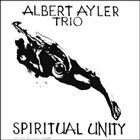Home » Jazz Articles » Album Review » Albert Ayler: Spiritual Unity
Albert Ayler: Spiritual Unity
And what of the music that came to be known as the avant-garde? Did it begin and end with Anton Webern? Not if artists like Taylor, Archie Shepp, Coltrane and Albert Ayler would have their way. And yet they were almost snuffed out before they could even be heard. The 1960s were tumultuous, not merely because of a collapse of the economy of New York, the growing awareness of civil rights across America and the rise of militant awareness among the young generation of boomers, but because of a veritable cultural revolution across the continent.
It was at this time that some little-known events helped create a new glue that bound "The Music" to a society that was sitting up and taking notice. On the leading edge was ESP, a small label founded by Bernard Stollman on the premise that "the artists alone will decide" what goes on record. A significant act, within the first eighteen months of its existence 45 albums were recorded.
Albert Ayler's Spiritual Unity was ESP's first recorded session, made on July 10, 1964. This was a path-breaking date that featured tenor saxophonist Albert Ayler, together with bassist Gary Peacock and drummer Sunny Murray. The trio was enlightened by the soul searching of John Coltrane, and Ayler and his rhythm section began to pull hard at the elasticity of the music. The saxophonist was in an imperious mood and his creativity had obviously reached unbridled heights. The joy of creation can be heard in the legendary syntax of Ayler's squeals and squawks and wild vibrato, which deepened his expressive and breathy voice. Gary Peacock can be heard almost unfettered as he thunders and growls full toned and flowing with harmonic ideas. Sunny Murray orbits the room with shimmering clashes and tinkles and rolls of thunder as well.
Only three tracks—"The Wizard," "Prophecy" and two epic variations of "Ghosts"—broke through the thick clouds of gospel fervor to become iconic examples of collective improvisation. This is what ought to emerge from any time capsule of the past century. And if it does not, then it will be fortunate indeed that ESP Disk has chosen to re-release this epic adventure on limited edition vinyl to launch a new series.
Track Listing
Ghosts (1st Variation); The Wizard; Prophecy (Spirits); Ghosts (2nd Variation).
Personnel
Albert Ayler
saxophone, tenorAlbert Ayler: tenor saxophone; Gary Peacock: bass; Sunny Murray: drums.
Album information
Title: Spiritual Unity | Year Released: 2009 | Record Label: ESP Disk
< Previous
The Gardener
Comments
Tags
Albert Ayler
CD/LP/Track Review
Raul D'Gama Rose
ESP Disk
United States
Jelly Roll Morton
Duke Ellington,
Charles Mingus,
John Coltrane,
Thelonious Monk,
George Russell
Cecil Taylor,
Bob Dylan
Archie Shepp,
Gary Peacock
Sunny Murray
Spiritual Unity
For the Love of Jazz
 All About Jazz has been a pillar of jazz since 1995, championing it as an art form and, more importantly, supporting the musicians who create it. Our enduring commitment has made "AAJ" one of the most culturally important websites of its kind, read by hundreds of thousands of fans, musicians and industry figures every month.
All About Jazz has been a pillar of jazz since 1995, championing it as an art form and, more importantly, supporting the musicians who create it. Our enduring commitment has made "AAJ" one of the most culturally important websites of its kind, read by hundreds of thousands of fans, musicians and industry figures every month.



















